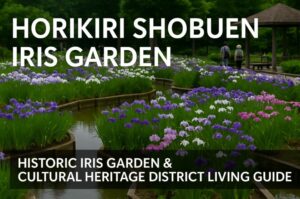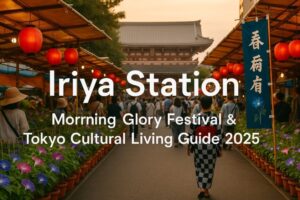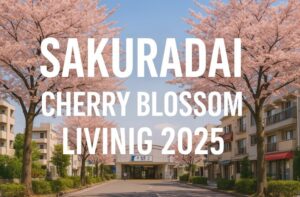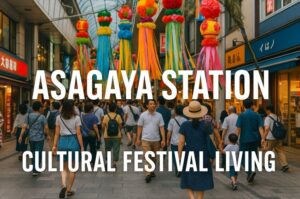Last Updated on 2025年9月23日 by IAJ
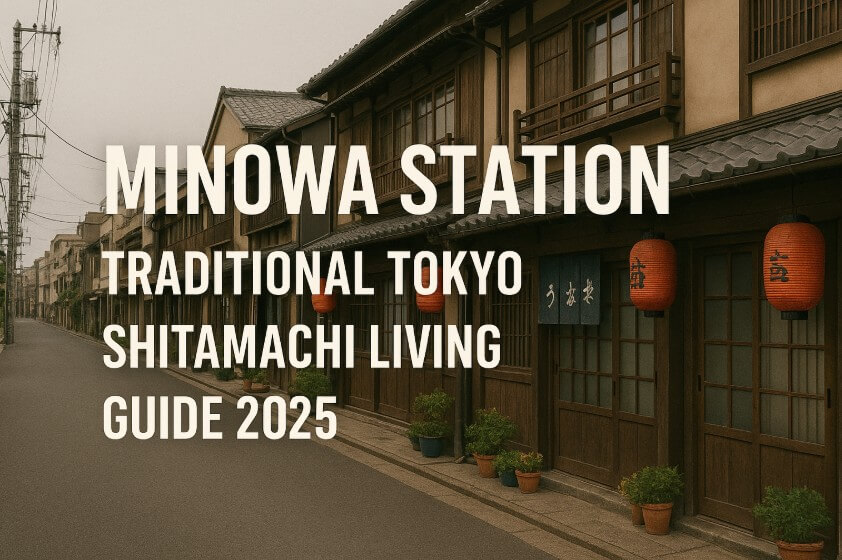
Discover Tokyo’s Most Authentic Traditional Downtown Experience: Minowa Station stands as Tokyo’s premier gateway to genuine “shitamachi” (traditional downtown) living, offering international residents the rare opportunity to experience authentic Japanese urban culture while maintaining exceptional cost-performance value and strategic urban connectivity. This historic neighborhood represents everything that makes Tokyo’s traditional downtown districts special – centuries-old commercial streets, time-honored local customs, and the warm community spirit that has defined Japanese urban life for generations. Unlike sterile modern developments or tourist-focused districts, Minowa provides the authentic cultural immersion that intelligent international residents seek, combined with practical advantages that make long-term Tokyo residence both affordable and deeply rewarding.
Located at the intersection of history and modern convenience, Minowa Station delivers the perfect balance of traditional Japanese residential authenticity and contemporary urban functionality. The station serves as your gateway to both the historic Joyful Minowa shopping street – featured in acclaimed films like “Shoplifters” – and efficient transportation connections that place you just 4 minutes from Ueno’s cultural treasures and business opportunities. This strategic positioning enables residents to enjoy the peaceful rhythm of traditional Japanese neighborhood life while maintaining seamless access to Tokyo’s economic and cultural centers.
Key Statistics at a Glance
| Metric | Value |
|---|---|
| Travel Time to Ueno | 4 minutes |
| Average 1K Rent | ¥85,000 |
| Cost Savings vs Central Tokyo | 45% less |
| Living Style | Traditional Shitamachi |
| Crime Rate | 0.02% |
| Historical Significance | Over 100 years |
🏮 Why Culturally-Minded International Residents Choose Minowa: This authentic traditional downtown location provides unparalleled access to genuine Japanese urban culture, exceptional cost-performance value, and the rare opportunity to live within a functioning historical community that continues centuries-old traditions while embracing respectful international integration.
①Strategic Transportation: Lightning-Fast 4-Minute Ueno Access
Minowa Station’s exceptional positioning on the Tokyo Metro Hibiya Line creates one of Tokyo’s most valuable transportation advantages for international residents seeking both cultural authenticity and urban connectivity. The remarkable 4-minute journey to Ueno Station – one of Tokyo’s most important cultural and transportation hubs – represents extraordinary value in Tokyo’s competitive residential market. This ultra-short commute connects residents directly to Ueno’s world-class museums, Ameyoko shopping district, and major JR line connections while maintaining the peaceful traditional atmosphere that supports authentic Japanese cultural experience.
The Hibiya Line’s strategic route through central Tokyo provides seamless connectivity to major business districts, shopping areas, and cultural attractions without the complexity of multiple transfers or lengthy travel times. From Minowa’s traditional downtown environment, residents can reach Ginza’s luxury shopping in 12 minutes, Akihabara’s electronics wonderland in 8 minutes, or Roppongi’s international business district in 18 minutes – all while returning each evening to the authentic Japanese community atmosphere that modern commercial districts cannot replicate.
Cost-Efficient Transportation Network
| Destination | Travel Time | IC Fare | Monthly Pass Cost |
|---|---|---|---|
| Ueno | 4 minutes | ¥170 | ¥6,380 |
| Ginza | 12 minutes | ¥200 | ¥7,480 |
| Akihabara | 8 minutes | ¥170 | ¥6,380 |
| Tokyo Station | 15 minutes | ¥200 | ¥7,480 |
| Roppongi | 18 minutes | ¥240 | ¥8,980 |
Multiple Station Access Advantages
Minowa Station (Tokyo Metro Hibiya Line)
- Primary access point with excellent frequency and reliability
- Direct connections to major business and cultural districts
- Comfortable, uncrowded station environment supporting stress-free commuting
Minami-Senju Station (10-minute walk)
- JR Joban Line access providing alternative route options
- Tsukuba Express connections for expanded regional access
- Additional shopping and dining options in modern station complex
Minowabashi Station (3-minute walk)
- Tokyo Sakura-tram (Toden Arakawa Line) terminus providing unique cultural transportation experience
- Connection to traditional Tokyo neighborhoods along historic tram route
- Scenic route through Tokyo’s remaining traditional residential areas
Traditional Transportation Heritage
The multiple transportation options surrounding Minowa create unique opportunities for international residents to experience Tokyo’s transportation evolution firsthand. The historic Toden Arakawa Line – Tokyo’s last remaining streetcar line – offers a romantic journey through traditional neighborhoods that preserve the atmosphere of mid-20th century Tokyo. This cultural transportation experience, combined with modern subway efficiency, provides residents with both practical mobility and authentic cultural immersion that cannot be found in newer residential developments.
②Authentic Shitamachi Environment: Living Japanese Urban Heritage
Minowa’s designation as one of Tokyo’s premier traditional downtown (shitamachi) districts provides international residents with unprecedented access to authentic Japanese urban culture that has evolved continuously for over a century. Unlike preserved tourist attractions or modern interpretations of traditional themes, Minowa represents living history where traditional Japanese commercial and residential practices continue to thrive alongside respectful modernization. This authentic cultural environment offers international residents the rare opportunity to participate in genuine Japanese community life while experiencing the warmth, wisdom, and social cohesion that defines traditional Japanese urban living.
The neighborhood’s traditional architecture, narrow streets, and historic commercial establishments create an urban environment that reflects Japanese aesthetic principles and community values developed over generations. Walking through Minowa’s residential areas reveals the subtle beauty of traditional Japanese urban design – wooden residential buildings with intricate details, small neighborhood shrines maintained by local communities, and the careful integration of private and public spaces that creates the distinctive atmosphere of Japanese downtown districts.
Historic Joyful Minowa Shopping Street Experience
The legendary Joyful Minowa shopping street stands as one of Tokyo’s most authentic traditional commercial districts, offering international residents direct access to the shopping and dining culture that defined Japanese urban life throughout the 20th century. This covered arcade, dating back over a century, gained international recognition through its prominent featuring in Hirokazu Kore-eda’s Palme d’Or-winning film “Shoplifters,” showcasing its authentic representation of traditional Japanese community life.
Traditional Shopping Culture Benefits:
- Authentic Local Pricing: Traditional family-operated businesses providing goods at local resident prices without tourist markup
- Personal Service Relationships: Opportunity to develop ongoing relationships with shop owners, experiencing traditional Japanese customer service culture
- Traditional Food Experiences: Access to home-style prepared foods, traditional snacks, and authentic Japanese ingredients rarely found in commercial chains
- Cultural Learning Opportunities: Daily interactions providing natural Japanese language practice and cultural understanding
- Historical Atmosphere: Shopping experience within preserved traditional Japanese commercial architecture and social customs
Traditional Residential Community Integration
Seasonal Community Participation:
- Traditional Japanese festivals and seasonal celebrations with authentic neighborhood participation
- Community cleaning activities (chokai) fostering neighborhood relationships and cultural understanding
- Traditional New Year preparations and celebrations experienced within genuine community context
- Summer festival participation with local families and multi-generational community members
Cultural Immersion Through Daily Life:
- Traditional Japanese residential customs experienced naturally through neighborhood participation
- Intergenerational community relationships providing insights into Japanese family and social structures
- Traditional Japanese conflict resolution and community harmony practices
- Authentic Japanese hospitality (omotenashi) experienced through genuine community relationships
Architectural Heritage and Aesthetic Environment
The traditional architecture surrounding Minowa Station provides international residents with daily exposure to authentic Japanese aesthetic principles and construction techniques that reflect centuries of cultural evolution. Traditional wooden residential buildings, narrow streets designed for pedestrian-scale interaction, and the careful integration of small commercial establishments within residential areas demonstrate the sophisticated urban planning principles that created liveable, sustainable communities long before modern urban design concepts emerged.
Small neighborhood shrines and traditional gardens integrated throughout the residential area provide spiritual and aesthetic focal points that continue to serve the community as they have for generations. These authentic cultural elements offer international residents opportunities for quiet reflection and cultural appreciation that cannot be replicated in modern developments or tourist-oriented districts.
③Exceptional Cost-Performance Analysis: Traditional Living Value
Minowa delivers Tokyo’s most compelling cost-performance equation for international residents seeking authentic cultural experience combined with practical financial advantages. The neighborhood’s traditional downtown status, combined with its slightly off-the-beaten-path location, creates exceptional value opportunities that enable smart residents to experience genuine Japanese urban culture while maintaining 40-50% savings compared to popular expat districts. This outstanding financial advantage extends beyond simple rent savings to encompass authentic Japanese pricing for daily necessities, traditional services, and cultural experiences that tourist-focused areas cannot match.
The authentic local pricing available throughout Minowa’s traditional shopping areas reflects genuine Japanese community values rather than inflated tourist or expat-focused pricing. Local restaurants, traditional shops, and service providers maintain community-oriented pricing that enables residents to experience authentic Japanese urban lifestyle at costs that reflect genuine local economic conditions rather than premium international market rates.
🏠 Discover Authentic Minowa Housing:
Ready to experience Tokyo’s most genuine traditional downtown living?
with exclusive access to traditional Japanese apartments and modern conveniences that respect historical neighborhood character. They specialize in international-friendly housing solutions with English support and competitive pricing that maximizes your authentic cultural experience value.
Comprehensive Cost Comparison Analysis (2025)
| Housing Type | Minowa Traditional | Popular Expat Areas | Monthly Savings |
|---|---|---|---|
| 1K Apartment | ¥85,000 | ¥125,000 | ¥40,000 |
| 1LDK Apartment | ¥115,000 | ¥175,000 | ¥60,000 |
| 2LDK Apartment | ¥150,000 | ¥230,000 | ¥80,000 |
| Traditional House | ¥200,000 | ¥320,000 | ¥120,000 |
Authentic Living Budget Analysis (1K Traditional Living)
- Rent: ¥85,000 (traditional atmosphere with modern conveniences)
- Transportation: ¥6,500 (Ueno monthly pass)
- Food & Traditional Shopping: ¥30,000 (authentic local market pricing)
- Utilities: ¥7,500 (efficient traditional building utility costs)
- Internet: ¥4,000 (standard broadband service)
- Total monthly cost: ¥133,000 (vs ¥185,000+ in expat-focused areas)
Cultural Experience Value Benefits
- Annual Savings Potential: ¥500,000-¥720,000 annually compared to commercial expat districts, enabling cultural experiences, travel, and traditional craft learning
- Authentic Experience Investment: Cost savings enabling participation in traditional Japanese cultural activities, lessons, and authentic experiences
- Traditional Craft Learning Budget: Financial flexibility for traditional Japanese arts, language study, and cultural education rarely affordable in expensive districts
- Cultural Event Participation: Budget availability for authentic festival participation, traditional entertainment, and genuine cultural celebrations
- Extended Cultural Immersion: Lower living costs supporting longer Tokyo residence and deeper cultural integration than expensive short-term options
Traditional Living Value Analysis
- Authentic Experience Premium: Genuine Japanese traditional urban culture at fraction of commercial cultural attraction costs
- Historical Environment Value: Living within functioning historical community providing daily cultural education and authentic experiences
- Traditional Service Access: Authentic Japanese services and craftsmanship at traditional community pricing rather than tourist premium rates
- Cultural Relationship Investment: Building genuine community relationships that provide long-term cultural understanding and personal enrichment
- Sustainable Cultural Living: Cost structure supporting extended traditional neighborhood participation and authentic cultural integration
④Traditional Daily Life Amenities: Authentic Community Integration
Minowa’s traditional downtown infrastructure provides international residents with authentic Japanese urban amenities that reflect centuries of community-oriented commercial development. Unlike modern commercial districts designed for efficiency and profit maximization, Minowa’s traditional businesses emphasize community service, personal relationships, and the preservation of traditional Japanese commercial customs that create warm, welcoming neighborhood environments for residents who appreciate authentic cultural experiences over generic convenience.
The neighborhood’s traditional approach to daily life services creates opportunities for international residents to experience Japanese customer service culture, develop meaningful relationships with local business owners, and participate in community-oriented commercial practices that build genuine social connections. These authentic interactions provide natural Japanese language practice, cultural learning opportunities, and the development of local knowledge that enables deeper community integration and cultural understanding.
Traditional Shopping and Commercial Infrastructure
Joyful Minowa Shopping Street Traditional Businesses:
- Traditional Food Preparation: Family-operated prepared food shops providing authentic Japanese home-style meals and traditional ingredients
- Traditional Crafts and Services: Local artisans and traditional service providers maintaining centuries-old skills and community relationships
- Community-Oriented Pharmacy: Traditional pharmacy providing healthcare guidance and community health services with personal attention
- Traditional Japanese Goods: Authentic Japanese household items, traditional clothing, and cultural objects at community pricing
- Local Information Hub: Traditional community bulletin systems and informal information sharing supporting neighborhood integration
Modern Convenience Integration:
- 24-Hour Convenience Access: Modern convenience stores providing international products while respecting neighborhood traditional atmosphere
- Contemporary Supermarket Options: Modern supermarkets offering international ingredients alongside traditional Japanese products
- Banking and Financial Services: Local bank branches providing traditional customer service with international account support
- Modern Communication Services: Internet and mobile services supporting contemporary needs within traditional neighborhood context
Healthcare and Medical Facilities
Traditional Community Healthcare:
- Minami-Senju Hospital: Comprehensive medical services within walking distance providing full healthcare coverage
- Local Clinic Network: Multiple neighborhood clinics providing primary care with traditional Japanese patient care approaches
- Traditional Medicine Options: Access to traditional Japanese medicine practitioners alongside modern medical services
- Community Health Programs: Neighborhood health activities and traditional wellness practices supporting community health culture
- Emergency Medical Access: Quick access to emergency medical services through established community healthcare networks
Educational and Cultural Resources
Traditional Culture Learning:
- Local Cultural Centers: Community centers providing traditional Japanese cultural education and community event coordination
- Traditional Arts Access: Opportunities to study traditional Japanese arts, crafts, and cultural practices within authentic community context
- Community Library Resources: Local library facilities providing Japanese cultural education and community information services
- Language Learning Environment: Natural Japanese language learning through daily community interactions and cultural participation
- Historical Education: Access to neighborhood historical information and traditional culture preservation activities
⑤Work-Life Balance: Traditional Tranquility with Modern Connectivity
Minowa’s traditional downtown atmosphere creates ideal conditions for international residents seeking productive work-life balance within an authentic Japanese cultural environment. The neighborhood’s peaceful traditional rhythm, combined with ultra-efficient 4-minute Ueno connectivity, provides the rare combination of cultural immersion and professional accessibility that enables residents to maintain demanding careers while experiencing genuine Japanese community life. This unique balance supports both professional success and authentic cultural integration that commercial districts cannot provide.
The traditional Japanese approach to community life, emphasizing harmony, mutual respect, and peaceful coexistence, creates natural support for focused professional work and personal development. The absence of commercial noise, tourist crowds, and urban chaos provides the mental clarity and cultural grounding that international professionals need for sustainable career development while building meaningful cultural relationships and personal enrichment through authentic community participation.
Living in Minowa means waking up to traditional Japanese neighborhood sounds, commuting through historic streets to modern business districts, working with the cultural confidence that comes from authentic community integration, and returning each evening to the peaceful traditional atmosphere that provides spiritual grounding and cultural depth unavailable in commercial or expat-focused residential areas.
Professional Work Environment Benefits
Home Office Traditional Advantages:
- Traditional Quiet Environment: Peaceful traditional neighborhood atmosphere supporting focused work, virtual meetings, and professional productivity
- Cultural Confidence Building: Daily authentic cultural experiences providing confidence for professional interactions with Japanese colleagues and clients
- Traditional Aesthetic Inspiration: Beautiful traditional architecture and cultural environment providing daily inspiration and mental clarity
- Community Rhythm Integration: Traditional neighborhood pace supporting healthy work schedules and sustainable professional practices
- Cultural Knowledge Enhancement: Authentic cultural understanding enhancing professional relationships and business cultural competency
Modern Connectivity Within Traditional Setting:
- High-Speed Internet Infrastructure: Reliable broadband services supporting remote work within traditional neighborhood environment
- Traditional Building Modern Adaptation: Historic buildings updated with modern amenities while preserving traditional character and peaceful atmosphere
- Professional Image Support: Quiet traditional background environments providing professional video call settings with authentic Japanese cultural elements
- Transportation Efficiency: Ultra-fast Ueno access enabling punctual professional commitments while maintaining traditional residential lifestyle
- Cultural Professional Development: Traditional community participation enhancing cultural competency valuable for Japan-focused career development
Mental Health and Cultural Well-being Advantages
Traditional Community Mental Health Support:
- Cultural Grounding: Daily participation in authentic Japanese community life providing cultural stability and personal identity development
- Traditional Stress Reduction: Japanese traditional lifestyle approaches naturally reducing stress through community harmony and traditional practices
- Seasonal Cultural Participation: Traditional Japanese seasonal activities providing natural rhythm and cultural celebration throughout the year
- Intergenerational Community Wisdom: Access to traditional Japanese wisdom and life philosophy through authentic community relationships
- Traditional Spiritual Resources: Neighborhood shrines and traditional spiritual practices providing contemplation and cultural spiritual experience
Authentic Cultural Learning Integration:
- Daily Cultural Education: Natural cultural learning through authentic community participation and traditional lifestyle integration
- Traditional Arts Access: Opportunities for traditional Japanese arts, crafts, and cultural practice supporting personal development and stress relief
- Community Cultural Events: Regular participation in authentic traditional festivals and seasonal celebrations building cultural understanding and community bonds
- Traditional Japanese Aesthetics: Daily exposure to authentic traditional Japanese beauty and cultural aesthetics supporting mental well-being and cultural appreciation
- Cultural Identity Development: Building authentic cultural competency and cross-cultural identity through genuine community integration rather than tourist-level cultural exposure
Life Balance Optimization Through Traditional Living
Traditional Community Life Rhythm:
- Natural Work-Life Separation: Traditional neighborhood environment providing clear transition between professional responsibilities and authentic cultural home life
- Seasonal Cultural Scheduling: Traditional Japanese seasonal rhythms providing natural structure for work-life balance and cultural participation
- Community Social Support: Traditional neighborhood relationships providing social support and cultural guidance supporting sustainable lifestyle balance
- Traditional Recreation Activities: Access to traditional Japanese recreation and leisure activities providing authentic cultural relaxation and personal development
- Cultural Reflection Time: Quiet traditional environment providing time and space for cultural reflection and personal growth through authentic Japanese lifestyle experience
⑥Safety and Traditional Community Culture: Living Japanese Social Harmony
Minowa exemplifies the traditional Japanese approach to community safety through social harmony, mutual responsibility, and collective care for neighborhood well-being. The authentic traditional downtown culture creates naturally secure living conditions through community awareness, environmental maintenance, and the traditional Japanese values of mutual respect and social cooperation that have maintained safe, liveable communities for generations. International residents benefit from this authentic community safety culture while learning to appreciate and participate in the traditional Japanese approach to creating and maintaining harmonious neighborhoods.
The neighborhood’s exceptionally low crime rate of 0.02% reflects not just statistical safety, but the deep cultural commitment to community harmony that characterizes authentic Japanese traditional communities. This safety emerges from traditional social practices, community monitoring, and the collective commitment to maintaining neighborhood peace and security that provides international residents with both physical safety and cultural education about traditional Japanese community values.
Traditional Community Safety Culture
Community-Based Security Systems:
- Traditional Neighborhood Watch: Informal community monitoring based on traditional Japanese social responsibility and mutual care
- Collective Community Maintenance: Traditional Japanese practices of community environmental care creating naturally safe and well-maintained public spaces
- Social Harmony Emphasis: Traditional Japanese conflict resolution and community harmony practices preventing problems and maintaining peaceful neighborhood atmosphere
- Traditional Authority Respect: Community respect for traditional authorities and social institutions supporting stable, secure community environment
- Intergenerational Community Cooperation: Traditional multi-generational community relationships providing natural monitoring and support for all residents
Cultural Safety Through Community Integration:
- Traditional Social Customs: Authentic Japanese social customs providing natural community integration and mutual protection through traditional relationships
- Community Event Participation: Traditional festivals and community activities building relationships that enhance security through authentic social connections
- Traditional Communication Practices: Japanese traditional communication styles building trust and mutual understanding that support community safety
- Cultural Education Through Community: Learning traditional Japanese safety consciousness and community responsibility through authentic neighborhood participation
- Traditional Hospitality Experience: Authentic Japanese community hospitality providing natural support and assistance for international residents
Environmental Safety and Traditional Maintenance
Traditional Community Environmental Care:
- Collective Cleaning Culture: Traditional Japanese community cleaning practices maintaining clean, safe public environments through collective responsibility
- Traditional Garden and Green Space Care: Community maintenance of traditional gardens and green spaces providing beautiful, safe neighborhood environments
- Traditional Building Maintenance: Community commitment to maintaining traditional architecture and infrastructure supporting safe, attractive neighborhood environment
- Natural Disaster Preparedness: Traditional Japanese disaster preparedness culture providing community support and emergency response systems
- Traditional Environmental Consciousness: Japanese traditional environmental values creating sustainable, safe community practices
Cultural Safety Education:
- Traditional Japanese Safety Consciousness: Learning authentic Japanese approaches to personal and community safety through daily community participation
- Emergency Response Cultural Integration: Understanding traditional Japanese emergency response and community support systems
- Traditional Risk Assessment: Learning traditional Japanese approaches to identifying and avoiding risks through community wisdom and cultural knowledge
- Cultural Conflict Resolution: Understanding traditional Japanese conflict resolution approaches maintaining community harmony and preventing problems
- Community Support Networks: Building authentic relationships providing natural support and assistance during challenges or emergencies
⑦Who Should Consider Traditional Minowa Living
Minowa attracts international residents who prioritize authentic cultural experience over superficial convenience, genuine community integration over commercial amenities, and the deep personal enrichment that comes from participating in living Japanese cultural traditions. This traditional downtown environment appeals to culturally curious professionals, artists, writers, and long-term Japan enthusiasts who understand that Tokyo’s most valuable experiences emerge from authentic community participation rather than tourist-oriented attractions or expat enclave living.
The neighborhood particularly suits international residents seeking to develop genuine Japanese language abilities, cultural competency, and cross-cultural relationships through daily authentic interactions rather than classroom learning or commercial cultural programs. Residents who appreciate traditional aesthetics, value community relationships, and enjoy the peaceful rhythm of traditional Japanese neighborhood life find Minowa provides unmatched opportunities for cultural growth and personal development.
Ideal Traditional Living Candidate Profiles
Cultural Immersion Enthusiasts:
- International residents prioritizing authentic Japanese cultural experience over Western amenities or international community convenience
- Language learners seeking natural Japanese language practice through daily community interactions and traditional cultural participation
- Cultural researchers, writers, and artists requiring authentic cultural environment for creative work and cultural understanding development
- Traditional arts and crafts practitioners seeking authentic cultural environment and traditional teacher-student relationships
- Long-term Japan enthusiasts building deep cultural competency through authentic community participation and traditional lifestyle adoption
Budget-Conscious Cultural Professionals:
- Early-career professionals seeking affordable Tokyo living while building cultural competency valuable for Japan-focused career development
- Remote workers prioritizing authentic cultural experience and traditional peaceful environment over central district convenience
- Cultural professionals requiring affordable living costs enabling traditional arts study, cultural activities, and authentic experience investment
- Creative professionals seeking traditional aesthetic inspiration and authentic cultural environment supporting artistic development
- Educational professionals building authentic cultural knowledge through traditional community participation and relationship development
Traditional Living Success Indicators
Cultural Adaptability and Respect:
- Genuine interest in learning and respecting traditional Japanese social customs and community expectations
- Patience for developing authentic relationships and cultural understanding through gradual community integration
- Appreciation for traditional Japanese aesthetics, lifestyle approaches, and community values
- Willingness to participate respectfully in traditional community activities and seasonal celebrations
- Understanding that authentic cultural integration requires time, effort, and genuine respect for traditional customs
Traditional Community Participation Readiness:
- Interest in building genuine relationships with Japanese neighbors and community members across generations
- Comfort with traditional Japanese communication styles and social interaction approaches
- Appreciation for the slower pace and deeper relationships characteristic of traditional community life
- Understanding that authentic cultural experience requires active participation rather than passive observation
- Commitment to contributing positively to traditional community harmony and collective well-being
Long-term Cultural Development Commitment:
- Planning extended Tokyo residence enabling deep cultural integration and authentic relationship development
- Investment in learning Japanese language to levels enabling meaningful traditional community participation
- Interest in traditional Japanese arts, crafts, and cultural practices as part of authentic cultural education
- Understanding that traditional community acceptance and deep cultural learning develop gradually through consistent respectful participation
- Commitment to maintaining traditional community values while contributing international perspectives respectfully
⑧Traditional Minowa Advantages vs Important Considerations
Exceptional Traditional Downtown Advantages
- Authentic Japanese Cultural Immersion: Unparalleled access to genuine traditional Japanese urban culture through living within functioning historical community
- Remarkable Transportation Value: 4-minute Ueno access providing ultra-efficient connectivity at exceptional cost-performance value
- Traditional Community Safety: 0.02% crime rate reflecting traditional Japanese community safety culture and social harmony
- Historic Cultural Heritage: Living within neighborhood featured in internationally acclaimed films representing authentic Japanese urban culture
- Traditional Shopping and Dining: Access to century-old commercial traditions providing authentic Japanese cultural and culinary experiences
- Cost-Performance Excellence: 45% savings compared to expat-focused areas while gaining authentic cultural immersion and traditional community participation
- Traditional Arts and Culture Access: Natural opportunities for traditional Japanese cultural learning and authentic master-student relationships
- Peaceful Traditional Atmosphere: Traditional Japanese neighborhood rhythm supporting work-life balance and cultural contemplation
- Multiple Transportation Options: Historic streetcar access alongside modern subway providing both practical mobility and cultural transportation experience
- Authentic Language Learning Environment: Natural Japanese language development through daily traditional community interactions
Important Considerations for International Residents
Cultural Adaptation Requirements:
- Traditional community living requires genuine respect for Japanese social customs and patient cultural adaptation
- Authentic community integration develops gradually through consistent respectful participation rather than immediate acceptance
- Traditional lifestyle rhythm may feel slow-paced for residents preferring high-energy urban environments or extensive nightlife options
Language and Communication Considerations:
- Meaningful traditional community participation benefits from developing functional Japanese language abilities
- Traditional community relationships rely on Japanese communication styles that may require cultural learning and adaptation
- Limited English-language services compared to international-focused residential areas
Lifestyle Compatibility Factors:
- Traditional neighborhood atmosphere may feel quiet for residents preferring extensive entertainment districts or international nightlife
- Authentic cultural experience requires active participation and cultural learning rather than passive residential convenience
- Traditional community values emphasize collective harmony over individual convenience or commercial service expectations
⑨Conclusion: Embracing Authentic Tokyo Through Traditional Downtown Living
Living near Minowa Station represents the ultimate choice for international residents seeking genuine cultural immersion within one of Tokyo’s most authentic traditional downtown environments. This remarkable neighborhood provides the rare opportunity to experience living Japanese cultural heritage while maintaining practical advantages that enable both professional success and deep personal enrichment through authentic community participation. With its exceptional combination of 4-minute Ueno access, traditional shitamachi atmosphere, and historic cultural significance, Minowa offers value that extends far beyond simple residential convenience to encompass transformative cultural experience and authentic community integration.
The neighborhood’s traditional downtown character, exemplified by the historic Joyful Minowa shopping street and preserved cultural practices, provides international residents with direct access to the cultural depth and community wisdom that defines authentic Japanese urban living. This authentic environment enables cultural learning, language development, and relationship building that commercial districts or expat enclaves cannot replicate, creating opportunities for personal growth and cross-cultural competency that benefit residents throughout their lives.
The remarkable cost-performance value, with 45% savings compared to expat-focused areas, enables residents to invest in authentic cultural experiences, traditional arts learning, and the cultural activities that create deep appreciation for Japanese cultural heritage. This financial advantage, combined with the peaceful traditional atmosphere and authentic community relationships, supports sustainable long-term residence that builds genuine cultural bridges and lasting personal enrichment.
As international interest in authentic Japanese culture continues to grow, Minowa stands as proof that Tokyo’s most valuable residential experiences emerge from respectful integration with traditional communities rather than commercial cultural attractions. The neighborhood attracts culturally curious international residents who understand that authentic cultural experience requires genuine community participation and respect for traditional values that have created harmonious neighborhoods for generations.
For international residents seeking more than mere accommodation in Tokyo – those who desire authentic cultural immersion, traditional community relationships, and the deep personal satisfaction that comes from respectful cross-cultural integration – Minowa provides unmatched opportunities within one of Tokyo’s most culturally significant and beautifully preserved traditional downtown environments.
